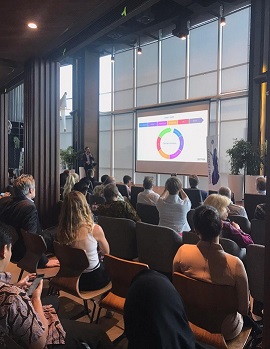Stop waste, go circular economy – Experiences from Finland
The Government of Finland focuses on circular economy - an important toolbox in achieving carbon-neutrality by 2035. From creating world’s first circular economy roadmap in 2016, Finland has taken a lead in circular thinking. In this spirit, the Embassy hosted a circular economy seminar to highlight Finland’s experiences and the potential in Indonesia. The seminar also inaugurated the Embassy’s circular economy video series.

The Embassy of Finland had the honour to host a circular economy seminar at the Greenhouse Co-working and Office Space on 10 October 2019. The event was successful in launching new dialogue on circular economy and in showcasing the most recent trends and innovations in this environmentally friendly and resource-wise economic model.
The ambassador, Mr. Jari Sinkari, opened the seminar by placing circular economy in a historical context. Challenging climate taught Finns to be frugal on materials and energy as well as innovative in adapting new work-saving methods. Most of our ancestors have used materials and products wisely, making everything durable and lost-lasting, hence circular economy is not a novel idea in economic thinking. By re-adopting these old approaches and using innovations, we can both reduce our impact on the environment and provide a boost to world economy.
Mr. Ernesto Hartikainen, leading expert at Sitra (Finnish Innovation Fund), talked about the emergence of circular economy thinking in the past years and how Finland has taken a lead in it. Finland was actually the first country to adopt a circular economy road map in 2016 with the lead of Sitra. Mr. Hartikainen’s presentation was followed by a question and answer session, which reflected key questions and challenges, such as the need and interest for providing more incentives and co-operation, in the transfer from the linear economic model into the circular model.
Mr. Hartikainen also emphasized how circular economy can bring more economic value by providing more jobs in the service and manufacturing sector when services and products are shared by more people. Did you know for instance that in Europe cars are standing still over 90% of the time? Ensuring that products are in constant use will boost the service sector and reduce the environmental impact.
Mr. M. Bijaksana Junerosano, Managing Director at Waste4Change, held a comment speech on the potential of circular economy in Indonesia. Just waste management in Indonesia could have an economic value of IDR 101 trillion or USD 7.2 billion a year.
Mr. Junerosano also summarized what he learned from attending the World Circular Economy Forum in Helsinki in June 2019. People in Finland have adopted circular thinking in their everyday lives by recycling more, sharing services and using public transportation. These types of examples are important in boosting circular economy also in Indonesia.
Mr. Jukka Sassi, senior scientist at VTT (Technical Research Centre of Finland), talked about circular economy’s potential in solving the global plastic challenge. Adoption of new technology helps to collect plastic waste and to reuse them into making new products and materials. The audience was particularly interested in technical matters of plastic waste collection and its reuse. These types of approaches are highly important in removing plastic and litter from the environment.
The Embassy also inaugurated its educational video series on circular economy in Bahasa Indonesia at the event. The Embassy has had the pleasure of cooperating with students of Universitas Multimedia Nusantara in creating the five videos. The videos are in Bahasa Indonesia with English subtitles and cover topics from the plastic challenge, recycling and waste-to-energy to forests. The videos will be published on the Embassy’s YouTube playlist – the first two ones are already there (link below). Please watch and share!
We want to thank everyone attending the seminar look forward to the continuation of the discussion on circular economy.

